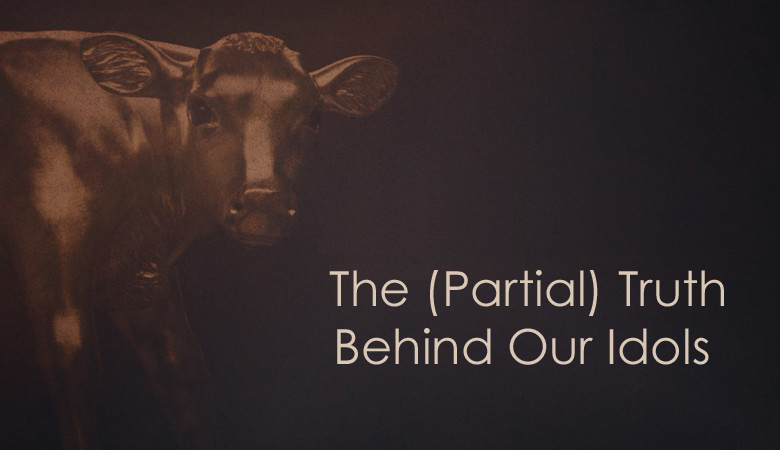The (Partial) Truth Behind our Idols

Idols are lies. Concerning idol-worshipers, Isaiah says, “A deceived heart has turned him aside; And he cannot deliver his soul, Nor say, ‘Is there not a lie in my right hand?’” An idol is a lie of such powerful deceptive power that it actually blinds us to its existence. We don’t realize the idol’s existence or power over our thoughts, actions, and destiny. It’s in the palm of our hand, but we don’t see it. And idols intoxicate millions.
Take one of our culture’s favorites, naturalism—the set of beliefs that deny God’s existence, trust human reason and the scientific method as the only means of discovering truth, and make this present world the only reality. In this worldview, human reason and nature itself have the highest value. One wing of this movement expresses its bumper-sticker theology this way: “Trees are the answer”—a snarky retort to Christians’ view that “Jesus is the Answer.”
Why are so many people in love with this idol? In part, idols deceive so powerfully because they often contain half-truths.
What half-truths make naturalism so potent? For one, Creation really is very, very good (Gen. 1:31). There is something heavenly about all of Creation; it’s covered in divine fingerprints. When we consider the starry heavens, when the dusty disc of our Milky Way galaxy comes into view, when the stillness of a mountain lake mirrors a green slope, something akin to worship naturally arises. In nature man stands “face to face … with something commensurate to his capacity for wonder” (Great Gatsby). Indeed, “the heavens declare the glory of God” (Psa. 19:1-6), and their speech is so powerful enough as to enchant many.
How should followers of Christ respond to such popular, alluring idols? First, we may reflect that light denied naturally results in sight distorted, values inverted, and idols worshiped. When people “suppress the truth in unrighteousness” and reject “what may be known of God,” they quickly learn to “worship and serve the creature rather than the Creator” (Rom. 1:18, 19, 25).
To cast down powerful idols, we can also imitate Isaiah’s God-given strategies. In God’s Word, Isaiah assaults the deception of idolatry by pointing out its foolishness (you cook your supper on one half of the log and worship the other?). Also, to expose false gods, he declares the incomparable greatness of the true God. “To whom will you liken Me, and make Me equal and compare Me, that we should be alike?” (Isa. 46:5).
In response to naturalism, like Isaiah, we can ask provocative questions such as, did such an amazing universe really come about by chance and random forces? Is it really likely that mindlessness gave birth to mind, that unconsciousness begat consciousness, and that brute forces—heartless and soul-less—gave birth to souls made for love and kindness? Is it really true that “all we are is dust in the wind” when everything inside us cries out for meaning and permanence and significance?
Also in keeping with Isaiah’s strategy, we can meditate on who God really is, who Jesus reveals God to be:
“… We beheld His glory, the glory as of the only begotten of the Father, full of grace and truth” (John 1:14).
“… He is not far from each one of us ….” (Acts 17:27)
“I am the Lord, that is My name;
And My glory I will not give to another,
Nor My praise to carved images.” (Isa. 42:8)
“…For I am God, and there is no other;
I am God, and there is none like Me,
Declaring the end from the beginning,
And from ancient times things that are not yet done,
Saying, ‘My counsel shall stand,
And I will do all My pleasure.” (Isa. 46:9-10)
Memorizing and meditating on who God has revealed Himself to be clarifies Creator from creation and guards us from idols and their strong deception.
“Little children, keep yourselves from idols. Amen” (1 John 5:21).

Leave a Reply